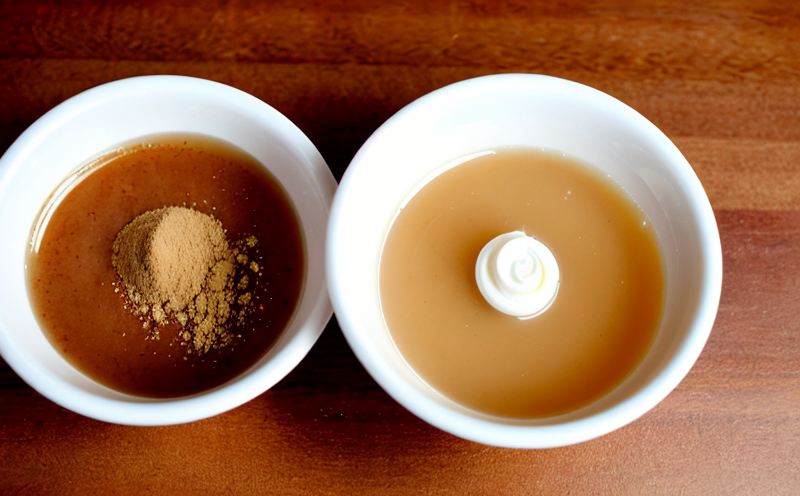ASTM D419 Flavor Chemical Residue Testing in Syrups
The ASTM D419 flavor chemical residue testing method is a critical process used to ensure that sweetener and flavor compounds are properly encapsulated within syrups. This test helps manufacturers avoid potential issues such as off-flavors, reduced shelf life, or contamination from free chemicals. The protocol measures the amount of flavor chemicals that have not been fully incorporated into the syrup base, thereby ensuring product quality and compliance with industry standards.
The significance of this testing cannot be overstated, especially in sectors like food manufacturing where the integrity of flavors directly impacts consumer satisfaction. Non-compliance can lead to recalls, reputational damage, and legal issues. This service is essential for companies looking to maintain a competitive edge by ensuring their products meet or exceed regulatory requirements.
The ASTM D419 method involves several key steps including sample preparation, extraction, and analysis using chromatographic techniques such as HPLC (High-Performance Liquid Chromatography). The test measures the concentration of free flavor compounds in the syrup which can then be compared against specified limits set by regulatory bodies.
Understanding that not all flavors are created equal, our laboratory ensures that each product undergoes a thorough evaluation tailored to its unique formulation. By adhering strictly to ASTM standards and employing state-of-the-art equipment, we guarantee accurate results that reflect the true quality of your syrup products.
| Step | Description |
|---|---|
| Sample Preparation | The sample is first diluted to ensure it falls within the linear range of the analytical instrument. Proper dilution also helps prevent matrix effects that could interfere with accurate quantification. |
| Extraction | This step involves extracting free flavor compounds from the syrup using a suitable solvent, typically methanol or acetonitrile. The choice of solvent depends on the specific flavor compounds being targeted and their solubility characteristics. |
| Analysis | The extracted solution is then injected into an HPLC system equipped with appropriate detectors such as UV-Vis, mass spectrometry (MS), or photodiode array detection (PAD). These advanced techniques provide precise quantification of flavor chemicals present in the syrup. |
| Reporting | A comprehensive report is generated detailing the concentration levels of each detected compound. Compliance with specified limits and any necessary corrective actions are also outlined. |
The detailed process outlined above highlights why ASTM D419 testing is indispensable for maintaining product integrity in sweetener and flavor syrup formulations. Our experienced team ensures that every test adheres rigorously to these standards, providing reliable data that supports informed decision-making throughout the development lifecycle.
Why It Matters
The importance of ASTM D419 testing cannot be overstated in ensuring product quality and regulatory compliance. By eliminating free flavor chemicals, manufacturers can enhance their products' stability and safety while maintaining consistent taste profiles.
- Enhanced Product Stability: Free flavor compounds tend to degrade over time, leading to changes in flavor profile and potential health concerns if not properly managed.
- Improved Consumer Satisfaction: Consistent quality ensures that customers receive the expected taste experience every time they use your product.
- Avoidance of Contamination Risks: Ensuring proper encapsulation reduces the risk of contamination from external sources, maintaining purity and safety standards.
- Regulatory Compliance: Adhering to industry guidelines helps avoid legal challenges and potential reputational damage associated with non-compliance.
In today's competitive market, these factors are crucial for building trust with consumers and maintaining a robust brand identity. Our commitment to excellence in ASTM D419 testing underscores our dedication to delivering high-quality services that meet or exceed industry expectations.
Scope and Methodology
The ASTM D419 method is designed specifically for determining the amount of free flavor chemicals present in syrups. This service covers a broad range of applications including sweeteners, natural flavors, artificial flavors, and other additives used to enhance the sensory attributes of beverages or food products.
| Sample Types | Description |
|---|---|
| Sweetener Syrups | These include high-intensity sweeteners like sucralose, aspartame, and stevia extracts. Testing ensures that these compounds are fully encapsulated within the syrup base to prevent degradation. |
| Natural Flavor Syrups | Derived from natural sources such as fruits or herbs, these syrups require careful monitoring to maintain their authentic taste profiles without free flavor contamination. |
| Artificial Flavor Syrups | Synthetically produced flavors are subject to rigorous testing to ensure they do not compromise the product's integrity and safety. |
The methodology involves several key steps including sample preparation, extraction, and analysis using chromatographic techniques such as HPLC. The test measures the concentration of free flavor compounds in the syrup which can then be compared against specified limits set by regulatory bodies.
Our laboratory adheres strictly to ASTM standards throughout this process. By employing state-of-the-art equipment and experienced personnel, we ensure accurate results that reflect the true quality of your syrup products. This commitment to precision supports informed decision-making across various stages of product development.
Quality and Reliability Assurance
At our laboratory, we prioritize quality control at every stage of the ASTM D419 testing process. Our robust quality management system ensures consistent accuracy and reliability in all our services.
- Stringent Quality Controls: Each step of sample preparation, extraction, and analysis is meticulously monitored to minimize errors and ensure precision.
- Calibration Protocols: All analytical instruments are regularly calibrated against certified reference materials to guarantee accurate measurements.
- Duplicate Testing: Multiple replicates of each sample are analyzed to verify consistency in results and reduce variability.
- Expert Personnel: Our highly trained professionals possess extensive experience in flavor chemistry and chromatography, ensuring that your products receive the highest level of scrutiny.
We also maintain a strict chain of custody for all samples processed through our facility. This ensures traceability and accountability throughout the testing process. By adhering to these stringent protocols, we uphold the integrity of every test conducted under ASTM D419 standards.





